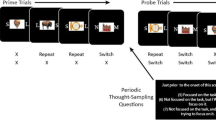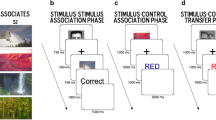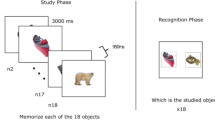Abstract
Cognitive control processes are central to adaptive behavior, but how control is applied in a context-appropriate manner is not fully understood. One way to produce context-sensitive control is by mnemonically linking particular control settings to specific stimuli that demanded those settings in a prior encounter. In support of this episodic reinstatement of control hypothesis, recent studies have produced evidence for the formation of stimulus-control associations in one-shot, prime-probe learning paradigms. However, since those studies employed perceptually identical stimuli across prime and probe presentations, it is not yet known how generalizable one-shot stimulus-control associations are. In the current study, we therefore probed whether associations formed between a prime object and the control process of task-switching would generalize to probe objects seen from a different viewpoint (Experiment 1), to different exemplars of the same object type (Experiment 2), and to different members of the object category (Experiment 3). We replicated prior findings of one-shot control associations for identical prime/probe stimuli. Importantly, we additionally found that these episodic control effects are expressed regardless of changes in viewpoint and exemplar, but do not seem to generalize to other category members. These findings elucidate the scope of generalization of the episodic reinstatement of cognitive control.




Similar content being viewed by others
References
Abrahamse, E., Braem, S., Notebeart, W., & Verguts, T. (2016). Grounding cognitive control in associative learning. Psychological Bulletin, 142(7), 693–728.
Allport, A., Styles, E. A., & Hsieh, S. (1994). Shifting intentional set: Exploring the dynamic control of tasks. In M. Moscovitch & C. Umilta (Eds.), Attention and Performance (15th ed., pp. 421–452). MIT Press.
Bates, D., Mächler, M., Bolker, B., & Walker, S. (2015). Fitting linear mixed-effects models using lme4. Journal of Statistical Software, 67(1), 1–48.
Blais, C., Robidoux, S., Risko, E. F., & Besner, D. (2007). Item-specific adaptation and the conflict-monitoring hypothesis: A computational model. Psychological Review, 114, 1076–1086.
Botvinick, M. M., Braver, T. S., Barch, D. M., Carter, C. S., & Cohen, J. D. (2001). Conflict monitoring and cognitive control. Psychological Review, 108, 624–652.
Braem, S., & Egner, T. (2018). Getting a Grip on Cognitive Flexibility. Current Directions in Psychological Science, 27(6), 470–476.
Brosowsky, N. P., & Crump, M. J. C. (2018). Memory-guided selective attention: Single experiences with conflict have long-lasting effects on cognitive control. Journal of Experimental Psychology: General, 147(8), 1134–1153.
Bugg, J. M., & Dey, A. (2018). When stimulus-driven control settings compete: On the dominance of categories as cues for control. Journal of Experimental Psychology Human Perception and Performance, 44(12), 1905–1932.
Bugg, J. M., & Hutchison, K. A. (2013). Converging evidence for control of color-word Stroop interference at the item level. Journal of Experimental Psychology Human Perception and Performance, 39(2), 433–449.
Bugg, J. M., Jacoby, L. L., & Chanani, S. (2011). Why it is too early to lose control in accounts of item-specific proportion congruency effects. Journal of experimental psychology Human Perception and Performance, 37(3), 844–859.
Chiu, Y. C., & Egner, T. (2017). Cueing cognitive flexibility: Item-specific learning of switch readiness. Journal of Experimental Psychology Human Perception and Performance, 43(12), 1950–1960.
Chiu, Y. C., & Egner, T. (2019). Cortical and subcortical contributions to context-control learning. Neuroscience & Biobehavioral Reviews, 99, 33–41.
Chiu, Y. C., Jiang, J., & Egner, T. (2017). The caudate nucleus mediates learning of stimulus-control state associations. The Journal of neuroscience : the official journal of the Society for Neuroscience, 37(4), 1028–1038.
Crump, M. J., McDonnell, J. V., & Gureckis, T. M. (2013). Evaluating Amazon’s Mechanical Turk as a tool for experimental behavioral research. PLoS One, 8(3), e57410.
Dreisbach, G., & Froeber, K. (2018). On how to be flexible (or not): modulation of the stability-flexibility balance. Current Directions in Psychological Science., 28, 3–9.
Egner, T. (2014). Creatures of habit (and control): A multi-level learning perspective on the modulation of congruency effects. Frontiers in Psychology, 5, 1247.
Egner, T. (2023). Principles of cognitive control over task-focus and task-switching. Nature Reviews Psychology, 2, 702–714.
Frings, C., Moeller, B., & Rothermund, K. (2013). Retrieval of event files can be conceptually mediated. Attention, Perception, & Psychophysics, 75(4), 700–709.
Frings, C., Hommel, B., Koch, I., Rothermund, K., Dignath, D., Giesen, C., Kiesel, A., Kunde, W., Mayr, S., Moeller, B., Möller, M., Pfister, R., & Philipp, A. (2020). Binding and Retrieval in Action Control (BRAC). Trends in Cognitive Sciences, 24(5), 375–387.
Goschke, T. (2003). Voluntary action and cognitive control from a cognitive neuroscience perspective. In S. Maasen, W. Prinz, & G. Roth (Eds), Voluntary Action: Brains, Minds, and Sociality (pp. 49-85). Oxford University Press.
Hebart, M. N., Dickter, A. H., Kidder, A., Kwok, W. Y., Corriveau, A., Van Wicklin, C., & Baker, C. I. (2019). THINGS: A database of 1,854 object concepts and more than 26,000 naturalistic object images. PLOS ONE, 14(10), e0223792.
Hommel, B., Müsseler, J., Aschersleben, G., & Prinz, W. (2001). The Theory of Event Coding (TEC): A framework for perception and action planning. The Behavioral and Brain Sciences, 24(5), 849–878. discussion 878-937.
Jiang, J., Heller, K., & Egner, T. (2014). Bayesian modeling of flexible cognitive control. Neuroscience & Biobehavioral Reviews, 46, 30–43. https://doi.org/10.1016/j.neubiorev.2014.06.001
Kahneman, D., Treisman, A., & Gibbs, B. J. (1992). The reviewing of object files: object-specific integration of information. Cognitive Psychology, 24(2), 175–219.
Kiesel, A., Steinhauser, M., Wendt, M., Falkenstein, M., Jost, K., Philipp, A. M., & Koch, I. (2010). Control and interference in task switching—A review. Psychological Bulletin, 136(5), 849–874. https://doi.org/10.1037/a0019842
Miller, E. K., & Cohen, J. D. (2001). An integrative theory of prefrontal cortex function. Annual Review of Neuroscience, 24, 167–202.
Monsell, S. (2003). Task switching. Trends in Cognitive Sciences, 7(3), 134–140.
Moutsopoulou, K., Yang, Q., Desantis, A., & Waszak, F. (2015). Stimulus–classification and stimulus–action associations: Effects of repetition learning and durability. Quarterly Journal of Experimental Psychology, 68(9), 1744–1757.
Muenster, N.D., Schmalbrock, P., Frings, C. (under review). A question of perspective: Perspective as a feature in stimulus-response binding. Visual Cognition
Pfeuffer, C. U., Moutsopoulou, K., Pfister, R., Waszak, F., & Kiesel, A. (2017). The power of words: On item-specific stimulus–response associations formed in the absence of action. Journal of Experimental Psychology: Human Perception and Performance, 43(2), 328–347.
Pfeuffer, C. U., Hosp, T., Kimmig, E., Moutsopoulou, K., Waszak, F., & Kiesel, A. (2018). Defining stimulus representation in stimulus-response associations formed on the basis of task execution and verbal codes. Psychological research, 82(4), 744–758.
Rogers, R. D., & Monsell, S. (1995). Costs of a predictable switch between simple cognitive tasks. Journal of Experimental Psychology: General, 124, 207–231.
Singh, T., Moeller, B., & Frings, C. (2016). Five shades of grey: Generalization in distractor based retrieval of S-R episodes. Attention, Perception & Psychophysics, 78(8), 2307–2312.
Spapé, M. M., & Hommel, B. (2008). He said, she said: Episodic retrieval induces conflict adaptation in an auditory Stroop task. Psychonomic Bulletin & Review, 15(6), 1117–1121.
Spinelli, G., & Lupker, S. J. (2020). Item-specific control of attention in the Stroop task: Contingency learning is not the whole story in the item-specific proportion-congruent effect. Memory & Cognition, 48(3), 426–435.
Treisman, A. M., & Gelade, G. (1980). A feature-integration theory of attention. Cognitive Psychology, 12(1), 97–136.
Verguts, T., & Notebaert, W. (2008). Hebbian learning of cognitive control: dealing with specific and nonspecific adaptation. Psychological Review, 115, 518–525.
Waszak, F., Hommel, B., & Allport, A. (2003). Task-switching and long-term priming: role of episodic stimulus-task bindings in task-shift costs. Cognitive Psychology, 46(4), 361–413.
Whitehead, P. S., Pfeuffer, C. U., & Egner, T. (2020). Memories of control: One-shot episodic learning of item-specific stimulus-control associations. Cognition, 199, 104220.
Whitehead, P. S., Mahmoud, Y., Seli, P., & Egner, T. (2021). Mind-wandering at encoding, but not retrieval, disrupts one-shot stimulus control learning. Attention, Perception, & Psychophysics, 83, 2968–2982.
Whitehead, P. S., Pfeuffer, C. U., & Egner, T. (2022). Assessing the durability of one-shot stimulus-control bindings. Journal of Cognition, 5(1), 26.
Acknowledgements
This study was supported by NIH grant MH116967 (T.E.).
Author information
Authors and Affiliations
Corresponding author
Ethics declarations
Conflict of interest
The authors have no competing interests to declare.
Additional information
Publisher's Note
Springer Nature remains neutral with regard to jurisdictional claims in published maps and institutional affiliations.
Open Practices Statement
All data and code are available via the Open Science Framework at https://osf.io/7kwtu/
Supplementary Information
Below is the link to the electronic supplementary material.
Rights and permissions
Springer Nature or its licensor (e.g. a society or other partner) holds exclusive rights to this article under a publishing agreement with the author(s) or other rightsholder(s); author self-archiving of the accepted manuscript version of this article is solely governed by the terms of such publishing agreement and applicable law.
About this article
Cite this article
Whitehead, P.S., Egner, T. One-shot stimulus-control associations generalize over different stimulus viewpoints and exemplars. Mem Cogn (2024). https://doi.org/10.3758/s13421-024-01573-0
Accepted:
Published:
DOI: https://doi.org/10.3758/s13421-024-01573-0




